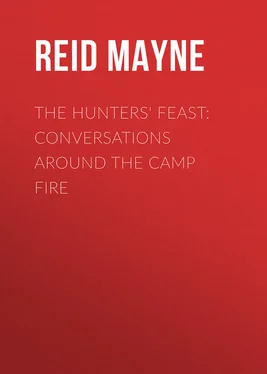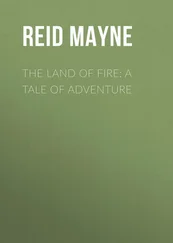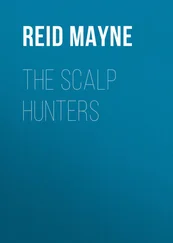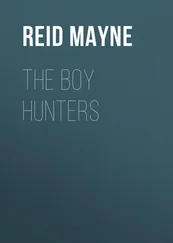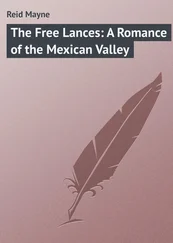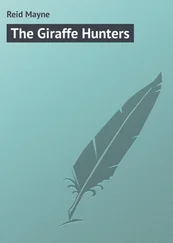Mayne Reid - The Hunters' Feast - Conversations Around the Camp Fire
Здесь есть возможность читать онлайн «Mayne Reid - The Hunters' Feast - Conversations Around the Camp Fire» — ознакомительный отрывок электронной книги совершенно бесплатно, а после прочтения отрывка купить полную версию. В некоторых случаях можно слушать аудио, скачать через торрент в формате fb2 и присутствует краткое содержание. Издательство: Иностранный паблик, Жанр: literature_19, foreign_antique, foreign_prose, на английском языке. Описание произведения, (предисловие) а так же отзывы посетителей доступны на портале библиотеки ЛибКат.
- Название:The Hunters' Feast: Conversations Around the Camp Fire
- Автор:
- Издательство:Иностранный паблик
- Жанр:
- Год:неизвестен
- ISBN:нет данных
- Рейтинг книги:5 / 5. Голосов: 1
-
Избранное:Добавить в избранное
- Отзывы:
-
Ваша оценка:
- 100
- 1
- 2
- 3
- 4
- 5
The Hunters' Feast: Conversations Around the Camp Fire: краткое содержание, описание и аннотация
Предлагаем к чтению аннотацию, описание, краткое содержание или предисловие (зависит от того, что написал сам автор книги «The Hunters' Feast: Conversations Around the Camp Fire»). Если вы не нашли необходимую информацию о книге — напишите в комментариях, мы постараемся отыскать её.
The Hunters' Feast: Conversations Around the Camp Fire — читать онлайн ознакомительный отрывок
Ниже представлен текст книги, разбитый по страницам. Система сохранения места последней прочитанной страницы, позволяет с удобством читать онлайн бесплатно книгу «The Hunters' Feast: Conversations Around the Camp Fire», без необходимости каждый раз заново искать на чём Вы остановились. Поставьте закладку, и сможете в любой момент перейти на страницу, на которой закончили чтение.
Интервал:
Закладка:
Mayne Reid
The Hunters' Feast: Conversations Around the Camp Fire
Chapter One.
A Hunting Party
On the western bank of the Mississippi, twelve miles below the embouchure of the Missouri, stands the large town of Saint Louis, poetically known as the “Mound City.” Although there are many other large towns throughout the Mississippi Valley, Saint Louis is the true metropolis of the “far west” – of that semi-civilised, ever-changing belt of territory known as the “Frontier.”
Saint Louis is one of those American cities in the history of which there is something of peculiar interest. It is one of the oldest of North-American settlements, having been a French trading port at an early period.
Though not so successful as their rivals the English, there was a degree of picturesqueness about French colonisation, that, in the present day, strongly claims the attention of the American poet, novelist, and historian. Their dealings with the Indian aborigines – the facile manner in which they glided into the habits of the latter – meeting them more than half-way between civilisation and savage life – the handsome nomenclature which they have scattered freely, and which still holds over the trans-Mississippian territories – the introduction of a new race (the half blood – peculiarly French) – the heroic and adventurous character of their earliest pioneers, De Salle Marquette, Father Hennepin, etcetera – their romantic explorations and melancholy fate – all these circumstances have rendered extremely interesting the early history of the French in America. Even the Quixotism of some of their attempts at colonisation cannot fail to interest us, as at Gallipolis on the Ohio, a colony composed of expatriated people of the French court; – perruquiers, coachbuilders, tailors, modistes , and the like. Here, in the face of hostile Indians, before an acre of ground was cleared, before the slightest provision was made for their future subsistence, the first house erected was a large log structure, to serve as the salon du Lal !
Besides its French origin, Saint Louis possesses many other points of interest. It has long been the entrepôt and depôt of commerce with the wild tribes of prairie-land. There the trader is supplied with his stock for the Indian market – his red and green blanket – his beads and trinkets – his rifles, and powder, and lead; and there, in return, he disposes of the spoils of the prairie collected in many a far and perilous wandering. There the emigrant rests on the way to his wilderness home; and the hunter equips himself before starting forth on some new expedition.
To the traveller, Saint Louis is a place of peculiar interest. He will hear around him the language of every nation in the civilised world. He will behold faces of every hue and variety of expression. He will meet with men of every possible calling.
All this is peculiarly true in the latter part of the summer season. Then the motley population of New Orleans fly from the annual scourge of the yellow fever, and seek safety in the cities that lie farther north. Of these, Saint Louis is a favourite “city of refuge,” – the Creole element of its population being related to that kindred race in the South, and keeping up with it this annual correspondence.
In one of these streams of migration I had found my way to Saint Louis, in the autumn of 18 – . The place was at the time filled with loungers, who seemed to have nothing else to do but kill time. Every hotel had its quota, and in every verandah and at the corners of the streets you might see small knots of well-dressed gentlemen trying to entertain each other, and laugh away the hours. Most of them were the annual birds of passage from New Orleans, who had fled from “yellow Jack,” and were sojourning here till the cold frosty winds of November should drive that intruder from the “crescent city;” but there were many other flaneurs as well. There were travellers from Europe: – men of wealth and rank who had left behind them the luxuries of civilised society to rough it for a season in the wild West – painters in search of the picturesque – naturalists whose love of their favourite study had drawn them from their comfortable closets to search for knowledge under circumstances of extremest difficulty – and sportsmen, who, tired of chasing small game, were on their way to the great plains to take part in the noble sport of hunting the buffalo. I was myself one of the last-named fraternity.
There is no country in the world so addicted to the table d’hôte as America, and that very custom soon makes idle people acquainted with each other. I was not very long in the place before I was upon terms of intimacy with a large number of these loungers, and I found several, like myself, desirous of making a hunting expedition to the prairies. This chimed in with my plans to a nicety, and I at once set about getting up the expedition. I found five others who were willing to join me.
After several conversaziones , with much discussion, we succeeded at length in “fixing” our plan. Each was to “equip” according to his own fancy, though it was necessary for each to provide himself with a riding horse or mule. After that, a general fund was to be “raised,” to be appropriated to the purchase of a waggon and team, with tents, stores, and cooking utensils. A couple of professional hunters were to be engaged; men who knew the ground to be traversed, and who were to act as guides to the expedition.
About a week was consumed in making the necessary preparations, and at the end of that time, under the sunrise of a lovely morning, a small cavalcade was seen to issue from the back suburbs of Saint Louis, and, climbing the undulating slopes in its rear, head for the far-stretching wilderness of the prairies. It was our hunting expedition.
The cavalcade consisted of eight mounted men, and a waggon with its full team of six tough mules. These last were under the manège of “Jake” – a free negro, with a shining black face, a thick full mop, and a set of the best “ivories,” which were almost always uncovered in a smile.
Peeping from under the tilt of the waggon might be seen another face strongly contrasting with that of Jake. This had been originally of a reddish hue, but sun-tan, and a thick sprinkling of freckles, had changed the red to golden-yellow. A shock of fiery hair surmounted this visage, which was partially concealed under a badly-battered hat. Though the face of the black expressed good-humour, it might have been called sad when brought into comparison with that of the little red man, which peeped out beside it. Upon the latter, there was an expression irresistibly comic – the expression of an actor in broad farce. One eye was continually on the wink, while the other looked knowing enough for both. A short clay-pipe, stuck jauntily between the lips, added to the comical expression of the face, which was that of Mike Lanty from Limerick. No one ever mistook the nationality of Michael.
Who were the eight cavaliers that accompanied the waggon? Six of them were gentlemen by birth and education. At least half that number were scholars. The other two laid no claim either to gentleness or scholarship – they were rude trappers – the hunters and guides of the expedition.
A word about each one of the eight, for there was not one of them without his peculiarity. First, there was an Englishman – a genuine type of his countrymen – full six feet high, well proportioned, with broad chest and shoulders, and massive limbs. Hair of a light brown, complexion florid, moustache and whiskers full and hay-coloured, but suiting well the complexion and features. The last were regular, and if not handsome, at least good humoured and noble in their expression. The owner was in reality a nobleman – a true nobleman – one of that class who, while travelling through the “States,” have the good sense to carry their umbrella along, and leave their title behind them. To us he was known as Mr Thompson, and, after some time, when we had all become familiar with each other, as plain “Thompson.” It was only long after, and by accident, that I became acquainted with his rank and title; some of our companions do not know it to this day, but that is of no consequence. I mention the circumstance here to aid me in illustrating the character of our travelling companion, who was “close” and modest almost to a fault.
Читать дальшеИнтервал:
Закладка:
Похожие книги на «The Hunters' Feast: Conversations Around the Camp Fire»
Представляем Вашему вниманию похожие книги на «The Hunters' Feast: Conversations Around the Camp Fire» списком для выбора. Мы отобрали схожую по названию и смыслу литературу в надежде предоставить читателям больше вариантов отыскать новые, интересные, ещё непрочитанные произведения.
Обсуждение, отзывы о книге «The Hunters' Feast: Conversations Around the Camp Fire» и просто собственные мнения читателей. Оставьте ваши комментарии, напишите, что Вы думаете о произведении, его смысле или главных героях. Укажите что конкретно понравилось, а что нет, и почему Вы так считаете.
